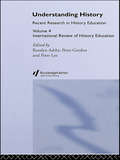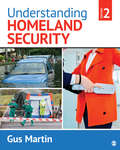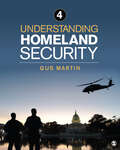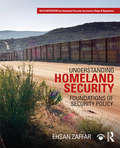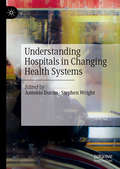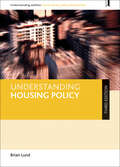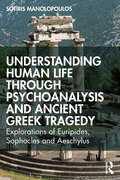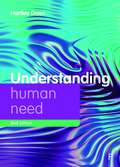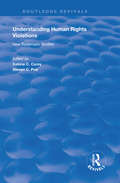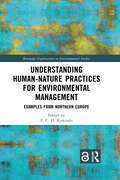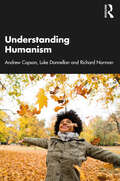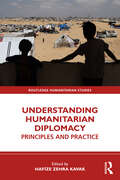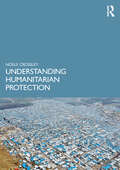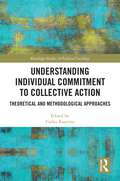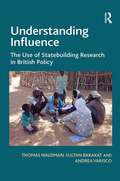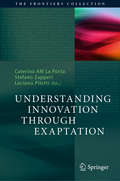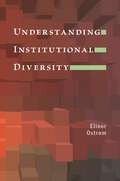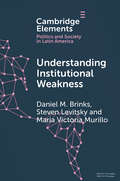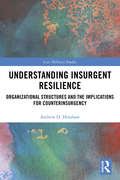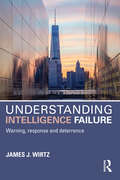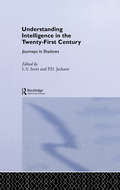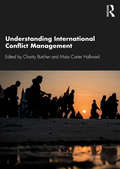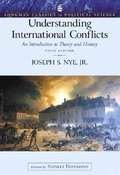- Table View
- List View
Understanding History: International Review of History Education 4 (Woburn Education Series)
by Peter Lee Peter Gordon Rosalyn AshbyWhat sense do children and young people make of history? How do they cope with competing historical accounts in textbooks? How do they think historical or archaeological claims are supported or rejected? And whatever students think about history, how do their teachers see history education? The contributors to this fourth volume of the International Review of History Education discuss these questions in the context of their research. Divided into two sections, the first part of the book examines students' ideas about the discipline of history and the knowledge it produces. The second part looks in detail at teachers' own ideas about teaching. Featuring contributions from authors throughout the world, including the USA, Canada, Portugal, Brazil, Taiwan and the UK, the book provides interesting studies of how history is both taught and received in these different countries.Understanding History contributes to current knowledge of successful teaching: that teachers must take into accounts students' preconceptions that they bring to the classroom as well as accepting the complexity and importance of their own professional knowledge. The book will be of interest to anyone studying or researching history education as well as teachers of history throughout the world.
Understanding Homeland Security
by Dr Gus MartinDr. Gus Martin’s Understanding Homeland Security, Second Edition is a thoroughly updated textbook offering much-needed insight into the complex nature of issues addressed by the homeland security enterprise. This comprehensive textbook addresses such subject areas as emergency management, terrorism, criminal justice administration, intelligence, armed conflict, and social environments. Martin’s pedagogical approach is designed to stimulate critical thinking in readers, allowing them to not only comprehend the fundamentals, but also evolve with the very dynamic nature of homeland security. The Second Edition introduces readers to homeland security in the modern era, focusing particularly on the post–September 11, 2001 world. Reviewing theories, agency missions, laws and regulations governing the homeland security enterprise, this book keeps readers on the forefront of homeland security.
Understanding Homeland Security
by Gus MartinDr. Gus Martin’s Understanding Homeland Security, Second Edition is a thoroughly updated textbook offering much-needed insight into the complex nature of issues addressed by the homeland security enterprise. This comprehensive textbook addresses such subject areas as emergency management, terrorism, criminal justice administration, intelligence, armed conflict, and social environments. Martin’s pedagogical approach is designed to stimulate critical thinking in readers, allowing them to not only comprehend the fundamentals, but also evolve with the very dynamic nature of homeland security. The Second Edition introduces readers to homeland security in the modern era, focusing particularly on the post–September 11, 2001 world. Reviewing theories, agency missions, laws and regulations governing the homeland security enterprise, this book keeps readers on the forefront of homeland security.
Understanding Homeland Security
by Gus MartinGus Martin′s Understanding Homeland Security, 4th edition offers much-needed insight into the complex nature of issues surrounding modern homeland security. This comprehensive textbook examines the theories, agency missions, laws, and regulations governing the homeland security enterprise through the lens of threat scenarios and countermeasures related to terrorism, natural disasters, emergency management, cyber security, and much more. Martin′s pedagogical approach is designed to stimulate critical thinking in readers, allowing them to not only comprehend the fundamentals, but to analyze and respond to various threat environments. The Fourth Edition introduces readers to homeland security in the modern era, focusing particularly on the post - September 11, 2001 world. Exploring cutting-edge topics, this book keeps readers on the forefront of homeland security.
Understanding Homeland Security
by Gus MartinGus Martin′s Understanding Homeland Security, 4th edition offers much-needed insight into the complex nature of issues surrounding modern homeland security. This comprehensive textbook examines the theories, agency missions, laws, and regulations governing the homeland security enterprise through the lens of threat scenarios and countermeasures related to terrorism, natural disasters, emergency management, cyber security, and much more. Martin′s pedagogical approach is designed to stimulate critical thinking in readers, allowing them to not only comprehend the fundamentals, but to analyze and respond to various threat environments. The Fourth Edition introduces readers to homeland security in the modern era, focusing particularly on the post - September 11, 2001 world. Exploring cutting-edge topics, this book keeps readers on the forefront of homeland security.
Understanding Homeland Security: Foundations of Security Policy
by Ehsan ZaffarUnderstanding Homeland Security is a unique textbook on homeland security that blends the latest research from the areas of immigration policy, counterterrorism research, and border security with practical insight from homeland security experts and leaders such as former Secretaries of the Department of Homeland Security Tom Ridge and Janet Napolitano. The textbook also includes: A historical overview of the origins of the homeland security enterprise as well as its post-9/11 transformation and burgeoning maturity as a profession In-depth descriptions of the state, local, and federal government entities, such as the U.S. Department of Homeland Security, that enforce and carry out the nation’s homeland security laws and policies Detailed discussion of relevant, contemporary topics such as asylum and refugee affairs, cybersecurity and hacking, border security, transportation and aviation security, and emergency management policy A chapter on homeland security privacy and civil liberties issues Unique current affairs analysis of controversial topics such as the National Security Agency’s warrantless wiretapping program, Edward Snowden, the 2016 U.S. presidential election, Russian cyberhacking efforts, and Black Lives Matter Advice, guidance, and insight for students through interviews with homeland security leaders as well as terrorism experts such as Bruce Hoffmann and biowarfare specialists such as Dr. Rebecca Katz The target audience for this text is advanced undergraduate or entry-level graduate students in criminology, intelligence analysis, public policy, public affairs, international affairs, or law programs. This textbook meets requirements for entry-level introductory courses in homeland security.
Understanding Hospitals in Changing Health Systems
by Stephen Wright Antonio Durán“This timely book provides insight into the changing role of the ‘hospital’ in the face of technological, organizational innovation and ever-tightening health budgets.”James Barlow, Imperial College Business School, UK“This book covers various relevant aspects of the hospital in different states and contexts. Underlining the importance of business models for future hospitals, this publication presents models of care from a historic and a current perspective. All authors possess a deep insight into different health care systems, not only as scholars but as experts working for world-renowned health policy institutions such as the World Health Organization, the World Bank or the European Observatory for Health Systems.”Siegfried Walch, Management Center Innsbruck, Austria“For an organisation like mine, representing those involved in the strategic planning of healthcare infrastructure, this book provides invaluable insights into what really matters – now and for the future – in the complex and contentious field of hospital development.”Jonathan Erskine, European Health Property Network, NetherlandsThis book seeks to reframe current policy discussions on hospitals. Healthcare services turn expensive economic resources—people, capital, pharmaceuticals, energy, materials—into care and cure. Hospitals concentrate the use and the cost of these resources, particularly highly-trained people, expensive capital, and embedded technologies. But other areas of health, such as public health and primary care, seem to attract more attention and affection, at least within the health policy community. How to make sense of this paradox? Hospitals choose, or are assigned, to deliver certain parts of care packages. They are organised to do this via “business models”. These necessarily incorporate models of care – the processes of dealing with patients. The activity needs to be governed, in the widest senses. Rational decisions need to be taken about both the care and the resources to be used. This book pulls these elements together, to stimulate a debate.
Understanding Housing Policy (Understanding Welfare: Social Issues, Policy and Practice series)
by Brian LundThe 3rd edition of this bestselling textbook has been completely revised to address the range of socio-economic factors that have influenced UK housing policy in the years since the previous edition was published. The issues explored include the austerity agenda, the impact of the Coalition government’s housing policies, the 2015 Conservative government’s policy direction, the evolving devolution agenda and the recent focus on housing supply. The concluding chapter examines new policy ideas in the context of theoretical approaches to understanding housing policy: laissez-faire economics; social reformism; Marxist political economy; behavioural perspectives and social constructionism. Throughout the textbook, substantive themes are illustrated by boxed examples and case studies. The author focuses on principles and theory and their application in the process of constructing housing policy, ensuring that the book will be a vital resource for undergraduate and postgraduate level students of housing and planning and related social policy modules.
Understanding Human Life through Psychoanalysis and Ancient Greek Tragedy: Explorations of Euripides, Sophocles and Aeschylus
by Sotiris ManolopoulosDrawing parallels between ancient theatre, the analytic setting, and the workings of psychic life, this book examines the tragedies of Euripides, Sophocles, and Aeschylus through a psychoanalytic lens, with a view of furthering the reader’s understanding of primitive mental states.What lessons can we learn from the tragic poets about psychic life? What can we learn about psychoanalytic work from ancient tragedy and playwrights? Sotiris Manolopolous considers how the key tenets of ancient Greek theatre – passion, conflict, trauma, and tragedy – were focussed on because they could not be spoken of in daily life and how these restraints have continued into contemporary life. Throughout, he considers how theatre can be used to stage political experiences and shows how these experiences are a vital part of understanding an analysand within an analytic setting. Drawing on his own clinical practice, Manolopoulos considers what ancient playwrights might teach us about early, uncontained agonies of annihilation and primitive mental states that manifest themselves both within the individual and the collective experience of contemporary life, such as climate change denial and totalitarian politicians.Drawing on canonical works such as Hippolytus, Orestes, Antigone, and Prometheus Unbound, this book continues the legacy of research that shows how contemporary analysts, students, and scholars can learn from ancient Greek literature and apply it directly to those negatively impacted by the trauma of 21st-century life and politics.
Understanding Human Need (Understanding Welfare: Social Issues, Policy and Practice)
by Hartley DeanThis second edition of a widely respected textbook is one of the few resources available to provide an overview of human need, as a key concept in the social sciences. Taking an approach encompassing both global North and South, this accessible and engaging book models existing practical and theoretical approaches to human need while also proposing a radical alternative. Incorporating crucial current debates and illustrations, the author explores: • distinctions between different types and levels of need; • how different approaches are reflected in different sorts of policy goals; • debates about the relationship between needs, rights and welfare; • contested thinking about needs in relation to caring, disadvantage and humanity. Fully revised and updated, this new edition pays due regard to the shifting nature of welfare ideologies and welfare regimes. Offering essential insights for students of social policy, it will also be of interest to other social science disciplines, policy makers and political activists.
Understanding Human Rights Violations: New Systematic Studies (Routledge Revivals)
by Steven C. PoeOriginally published in 2004. This excellent volume presents a systematic analysis of various human rights violations around the globe, focusing on security and subsistence rights. The book collects important contributions to the theoretical development of the human rights phenomenon, covering a wide range of human rights issues and research approaches. The research presented combines a variety of qualitative and quantitative approaches and brings together both theoretical and empirical work. It places particular emphasis on making the advanced statistical methods that are used to test the arguments accessible to a wider readership. Understanding Human Rights Violations will prove a useful tool for all in the fields of international human rights, peace studies, political violence and international law, and offers a valuable introduction into the literature on human rights violations.
Understanding Human-Nature Practices for Environmental Management: Examples from Northern Europe (Routledge Explorations in Environmental Studies)
by E. C. H. KeskitaloNature has often been understood in literature through a disjunction to human systems. This can be seen in the nature-culture binary, or even more clearly in the opposition of ‘wilderness’ to ‘civilization’.Drawing on historical and present-day examples and case studies from Northern Europe, this book critically examines the ways in which the use of such dichotomies can be transcended to respond to sustainability challenges. Using illustrative examples, the authors demonstrate how shared histories and development of land use continue to impact multiple practices today. The book explores the prerequisites for environmental management approaches that counterpose the nature-culture binaries that are present in existing governance mechanisms.This volume will be of great interest to students and scholars of environmental management, environmental law and policy and environmental anthropology.
Understanding Humanism
by Richard Norman Andrew Copson Luke DonnellanUnderstanding Humanism is an easy-to-read and informative overview of the beliefs, practices, and values of humanism as a non-religious worldview. This short and lively book explores humanism both as a broad historical tradition of thought and as a stance embodied in organised institutions. It sets out clearly and systematically the beliefs and values of humanism as well as the reality and personal experience of living as a humanist today. Questions discussed in this book include: How do humanists see the relation between science and religious belief? Is humanism wedded to science as the only valid form of knowledge? What value do humanists place on the arts, and can they value religious art? Does the emphasis on human responsibility depend on an untenable belief in 'free will', and is this undermined by psychology and neuroscience? Do humanists think that life is sacred? What account would humanists give of the basis of human rights, and why they are important? Does humanism entail that human life is meaningless and pointless? Can humanists meet the challenge of nihilism? Understanding Humanism provides a reliable and easily digestible introduction to the field. By exploring these questions and inviting readers to engage with the arguments, it serves as the ideal textbook for those approaching the topic of humanism for the first time.
Understanding Humanitarian Diplomacy: Principles and Practice (Routledge Humanitarian Studies)
by Hafize Zehra KavakThis book introduces readers to the development, principles, and philosophy of humanitarian diplomacy, before demonstrating how it works in practice, using a range of case studies from humanitarian work in the field.Humanitarian diplomacy seeks to create avenues to persuade decision makers and opinion leaders to act, at all times, in the interests of vulnerable people and with full respect for fundamental humanitarian principles. This book considers the historical evolution of humanitarian diplomacy, its theoretical underpinnings, its relationship with classic diplomacy, international law, and the greater ecosystem in which it exists, and the characteristics and attitudes essential for humanitarian diplomats. The book also draws on a range of first-hand experiences to showcase humanitarian diplomacy’s success in solving humanitarian issues. In doing so, it draws attention to the challenges faced by humanitarian workers and serves as an invaluable roadmap for aspiring humanitarians.Bringing an excellent balance of theory and practice, this book will be a perfect guide for students and practitioners looking to understand the historical, philosophical, legal, and practical foundations of humanitarian diplomacy.
Understanding Humanitarian Protection
by Noele CrossleyThis new textbook provides an introduction to humanitarian protection, a field of study concerned with international responses to armed conflict, political violence, and humanitarian crisis. The book engages with a wide range of empirical and normative questions, providing an overview of the academic literature whilst simultaneously discussing the policies and practices associated with protective responses to conflict and humanitarian emergencies that put the lives and livelihoods of vulnerable populations, including civilians, refugees, and minority groups, at risk. Divided into three parts, covering the origins of the humanitarian protection regime, the range of actors involved, and the responsibilities of these actors, the book offers an accessible entry point into the major contemporary debates, providing readers with the conceptual tools for understanding core issues. Key points are reinforced and illustrated through the deployment of selected case studies, and a comprehensive glossary is provided for key terms. Each chapter ends with a summary of key points, questions for further reflection, and a list of recommended reading. This book will be of much interest to students of human protection, humanitarianism, the Responsibility to Protect, human security, peacekeeping, and International Relations in general.
Understanding Individual Commitment to Collective Action: Theoretical and Methodological Approaches (Routledge Studies in Political Sociology)
by Carlos RamírezWhen speaking colloquially of political participation or civic action, one thinks, in the first instance, of groups and organizations such as political parties, social movements or various types of voluntary associations. The perspective of individuals is not the first thing that comes to mind when seeking to understand their functioning. In contrast to this vision, understanding the dynamics of participation requires taking a closer look at the individual, that is, at his or her moral dispositions and projects, his or her multiple and simultaneous identities, the breaking points in his or her biographical trajectory, the roles he or she adopts in an organization or the styles of communication which he or she uses. The book comprises a variety of case studies and theoretical and methodological contributions that, independent of rational choice theories, seek to understand collective action at the level of the individual and, in doing so, to articulate the various fields of study in this regard with the singularity of biographies and the reflective personal identities that characterize contemporary individualism.
Understanding Influence: The Use of Statebuilding Research in British Policy
by Thomas Waldman Sultan BarakatThe overarching objective of this book is to analyse the manner in which statebuilding-oriented research has and can influence policies in fragile, post-conflict environments. Large-scale, externally-assisted statebuilding is a relatively new and distinct foreign policy domain having risen to the forefront of the international agenda as the negative consequences of state weakness have been repeatedly revealed in the form of entrenched poverty, regional instability and serious threats to international security. Despite the increasing volume of research on statebuilding, the use and uptake of findings by those involved in policymaking remains largely under-examined. As such, the main themes running through the book relate to issues of research influence, use and uptake into policy. It grapples with problems associated with decision-making dynamics, knowledge management and the policy process and draws on concepts and analytical models developed within the public policy and research utilisation literature. This book will be of great interest to researchers, knowledge managers and policymakers working in the fields of post-war reconstruction, statebuilding, fragile states, stabilisation, conflict and development.
Understanding Innovation Through Exaptation (The Frontiers Collection)
by Stefano Zapperi Caterina AM La Porta Luciano PilottiThis book explores the role of exaptation in diverse areas of life, with examples ranging from biology to economics, social sciences and architecture. The concept of exaptation, introduced in evolutionary biology by Gould and Vrba in 1982, describes the possibility that already existing traits can be exploited for new purposes throughout the evolutionary process. Edited by three active scholars in the fields of biology, physics and economics, the book presents an interdisciplinary collection of expert viewpoints illustrating the importance of exaptation for interpreting current reality in various fields of investigation. Using the lenses of exaptation, the contributing authors show how to view the overall macroscopic landscape as comprising many disciplines, all working in unity within a single complex system. This book is the first to discuss exaptation in both hard and soft disciplines and highlights the role of this concept in understanding the birth of innovation by identifying key elements and ideas. It also offers a comprehensive guide to the emerging interdisciplinary field of exaptation, provides didactic explanations of the basic concepts, and avoids excessive jargon and heavy formalism. Its target audience includes graduate students in physics, biology, mathematics, economics, psychology and architecture; it will also appeal to established researchers in the humanities who wish to explore or enter this new science-driven interdisciplinary field.
Understanding Institutional Diversity
by Elinor OstromThe analysis of how institutions are formed, how they operate and change, and how they influence behavior in society has become a major subject of inquiry in politics, sociology, and economics. A leader in applying game theory to the understanding of institutional analysis, Elinor Ostrom provides in this book a coherent method for undertaking the analysis of diverse economic, political, and social institutions.Understanding Institutional Diversity explains the Institutional Analysis and Development (IAD) framework, which enables a scholar to choose the most relevant level of interaction for a particular question. This framework examines the arena within which interactions occur, the rules employed by participants to order relationships, the attributes of a biophysical world that structures and is structured by interactions, and the attributes of a community in which a particular arena is placed.The book explains and illustrates how to use the IAD in the context of both field and experimental studies. Concentrating primarily on the rules aspect of the IAD framework, it provides empirical evidence about the diversity of rules, the calculation process used by participants in changing rules, and the design principles that characterize robust, self-organized resource governance institutions.
Understanding Institutional Weakness: Power and Design in Latin American Institutions (Elements in Politics and Society in Latin America)
by Maria Victoria Murillo Steven Levitsky Daniel M. BrinksThis Element introduces the concept of institutional weakness, arguing that weakness or strength is a function of the extent to which an institution actually matters to social, economic or political outcomes. It then presents a typology of three forms of institutional weakness: insignificance, in which rules are complied with but do not affect the way actors behave; non-compliance, in which state elites either choose not to enforce the rules or fail to gain societal cooperation with them; and instability, in which the rules are changed at an unusually high rate. The Element then examines the sources of institutional weakness.
Understanding Insurgent Resilience: Organizational Structures and the Implications for Counterinsurgency (Cass Military Studies)
by Andrew D. HenshawThis book examines terrorist and insurgent organisations and seeks to understand how such groups persist for so long, while introducing a new strategic doctrine for countering these organisations. The work discusses whether familial or meritocratic insurgencies are more resilient to counterinsurgency pressures. It argues that it is not the type of organization that determines resilience, but rather the efficiency functions of social capital and trust, which have different natures and forms, within them. It finds that while familial insurgencies can challenge incumbents from the start, they weaken over time, whereas meritocracies will generally strengthen. The book examines four of the most enduring and lethal insurgent organizations: the Haqqani Network in Afghanistan, Lashkar-e-Taiba in Pakistan, Jemaah Islamiyah in Indonesia, and the Abu Sayyaf in the Philippines. The author breaks down each group into its formative strengths and vulnerabilities and presents a bespoke model of strategic counterintelligence that can be used to manipulate, degrade and destroy each organization. This book will be of much interest to students of counterinsurgency, terrorism, intelligence, security and defence studies in general.
Understanding Intelligence Failure: Warning, Response and Deterrence (Studies in Intelligence)
by James J. WirtzThis collection, comprising key works by James J. Wirtz, explains how different threat perceptions can lead to strategic surprise attack, intelligence failure and the failure of deterrence. This volume adopts a strategist’s view of the issue of surprise and intelligence failure by placing these phenomena in the context of conflict between strong and weak actors in world affairs. A two-level theory explains the incentives and perceptions of both parties when significant imbalances of military power exist between potential combatants, and how this situation sets the stage for strategic surprise and intelligence failure to occur. The volume illustrates this theory by applying it to the Kargil Crisis, attacks launched by non-state actors, and by offering a comparison of Pearl Harbor and the September 11, 2001 attacks. It explores the phenomenon of deterrence failure; specifically, how weaker parties in an enduring or nascent conflict come to believe that deterrent threats posed by militarily stronger antagonists will be undermined by various constraints, increasing the attractiveness of utilising surprise attack to achieve their objectives. This work also offers strategies that could mitigate the occurrence of intelligence failure, strategic surprise and the failure of deterrence. This book will be of much interest to students of intelligence studies, strategic studies, security studies and IR in general.
Understanding Intelligence in the Twenty-First Century: Journeys in Shadows (Studies In Intelligence Ser.)
by L. V. Scott P. D. JacksonIntelligence has never been more important in world politics than it is now at the opening of the twenty-first century. The terrorist attacks on the United States on September 11, 2001, along with the politics and diplomacy of the Second Gulf War, have brought intelligence issues to the forefront of both official and popular discourse on security and international affairs. The need for better understanding of both the nature of the intelligence process and its importance to national and international security has never been more apparent. The aim of this collection is to enhance our understanding of the subject by drawing on a range of perspectives, from academic experts to journalists to former members of the British and American intelligence communities.
Understanding International Conflict Management
by Maia Carter Hallward Charity ButcherThis new textbook introduces key mechanisms and issues in international conflict management and engages students with a comprehensive interdisciplinary approach to mitigating, managing, and transforming international conflicts. The volume identifies key historical events and international agreements that have shaped and defined the field of international conflict management, as well as key dilemmas facing the field at this juncture. The first section provides an overview of key mechanisms for international conflict management, such as negotiation, mediation, nonviolent resistance, peacekeeping, peacebuilding, transitional justice, and reconciliation. The second section tackles important cross-cutting themes, such as technology, religion, the economy, refugees and migration, and the role of civil society, examining how these issues contribute to international conflicts and how they can be leveraged to help address such conflicts. Each chapter includes a brief historical overview of the evolution of the issue or mechanism, identifies key theoretical and practical debates, and includes case studies, discussion questions, website links, and suggested further reading for further study and engagement. By providing a mixture of theory and practical examples, this textbook provides students with the necessary background to navigate this interdisciplinary field. This volume will be of great interest to students of international conflict management, conflict resolution, peace studies, and international relations in general.
Understanding International Conflicts: An Introduction to Theory and History
by Joseph S. NyePlaces international conflict within the larger context of political economy
